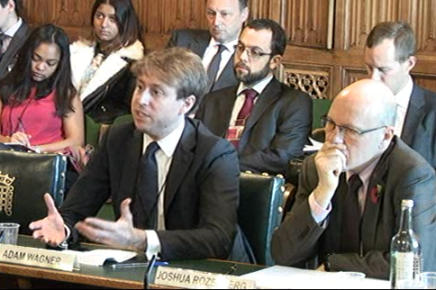Evidence to Parliament on prisoner voting
30 October 2013
 This morning Joshua Rozenberg and I gave evidence the Joint Select Committee on the Draft Voting Eligibility (Prisoners) Bill. You can watch our evidence session here – we are on from 10:34:30.
This morning Joshua Rozenberg and I gave evidence the Joint Select Committee on the Draft Voting Eligibility (Prisoners) Bill. You can watch our evidence session here – we are on from 10:34:30.
It was an interesting experience. There is clearly a range of views on the committee, to say the least. It will be fascinating to see what happens next – it is already almost a year since the draft bill was published and, as Joshua Rozenberg said, it seems quite possible that this issue will not be resolved one way or the other before the 2015 General Election, which is only 18 months away.
Perhaps predictably (I was, after all, complaining about other people’s mistakes), I got something wrong in my evidence. Abu Qatada did (contrary to what I said) get damages from the European Court of Human Rights in A&Ors. I think he was the fifth applicant (it is not clear from the judgment) and received €3,400. The human rights damages story I was referring to in that part of my evidence, and the problems with how it was reported, is described here.
Sign up to free human rights updates by email, Facebook, Twitter or RSS
Related posts
- The latest prisoner votes judgment may be our Marbury v Madison – Jamie Fletcher & Charlie Eastaugh
- This Supreme Court prisoner voting decision really is a victory for common sense
- “No-one should be under any doubt – prisoners are not getting the vote under this government”



“it seems quite possible that this issue will not be resolved one way or the other before the 2015 General Election, which is only 18 months away.”
I thought it had already been resolved in Hirst v UK (no2), which is a final judgment, not some sort of opinion which the human-rights abusing UK can ignore.
BTW I notice that Parliament is still breaking the Equality Act as well by failing to provide BSL and subtitles for Deaf people.
I have been watching Adam’s evidence on the press.
At the end you say…
Armenia
Estonia,
Russia,
Bulgaria
Geogia
Hungary
UK
Don’t have some sort of prisoner voting.
What about Turkey?
And Mr Ahmet Atahür Söyler?
Wasn’t there a blanket ban on prisoner voting in Turkey, or was the case more complex?
TH.
According to the judgment: in Turkey, disenfranchisement was an automatic consequence derived from the statute, and was therefore not left to the discretion or supervision of a judge. Moreover, such a measure was indiscriminate in its application as it did not take into account the nature or gravity of
the offence, the length of the prison sentence or the prisoner’s individual conduct or circumstances.
The court disagreed with the Turkish Government’s argument that the current legal framework adequately protected convicted prisoners’ voting rights as it limited the scope of the ban to those who had intentionally committed an offence, thus taking into account the nature of the offence. Hence, an ‘intention’ element exists under Turkish legislation but not under e.g. ROPA. I would agree (as did Strasbourg) that this is nonetheless blanket and so would fit the list above.
@ Ruvi
Thanks for this.
TH
You should have adopted the approach taken by the central witness who preceded you. I missed some of his evidence, but little that I heard seemed clear. So, no way of knowing if he was right or wrong.
But Shock of the Day was hearing Joshua Rozenberg declare that Strasbourg and Luxembourg are two different places and neither is in the Netherlands. Do you think he will be forced to retract that?